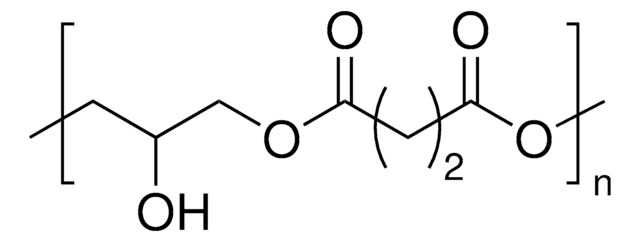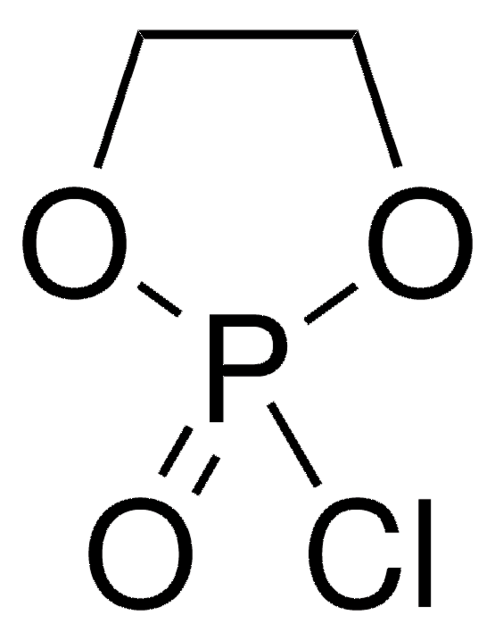おすすめの製品
フォーム
liquid
品質水準
色
colorless
保管温度
−20°C
SMILES記法
O=P1(OCCO1)OCC
InChI
1S/C4H9O4P/c1-2-6-9(5)7-3-4-8-9/h2-4H2,1H3
詳細
Ethyl ethylene phospholane is a versatile monomer building block for the synthesis of biocompatible and biodegradable polymers. Ring opening polymerization (ROP) of this phospholane monomer in the presence of metal/organocatalysts yields poly(phosphoester)s (PPE) that are commonly used in biomedical research applications.
アプリケーション
Ethyl ethylene phospholane, also known as ethyl ethylene phophate or 2-ethoxy-1,3,2-dioxaphospholane 2-oxide, is used in many polymerization applications including:
- Polymer synthesis: This monomer is used as a building block to synthesize biodegradable and biocompatible polyphosphoesters
- Nanocarrier development: Polymers synthesized from the ehtyl ethylene phospholane monomer create efficient nanocarriers for drug delivery and gene therapy, including for use in targeted and controlled release of therapeutics
- Hydrogel fabrication: This monomer can be used to develop polymers for tissue engineering applications, offering scaffods with excellent biocompatibility and potential for cell growth and regeneration
特徴および利点
Features and benefits of the ethyl ethylene phospholane include:
- Biocompatible and biodegradable: Through ring opening polymerization (ROP) of ethyl ethylene phospholane monomer, it is possible to synthesize polymers used in biomedical applications that are cell compatible and degrade over time
- Thermoresponsive behavior: In aqueous solutions, this monomer exhibits a lower critical solution temperature (LCST), making it responsive to changes in temperature, expanding its potential in controlled release system
- pH-responsive degradation: The resulting polymers can be designed to degrade at specific pH levels, allowing for targeted release of encapsulated substances
- Water soluble: This monomer enables the synthesis of water-soluble polymers, facilitating their incorporation into various aqueous formulations The biomedical research grade ethyl ethylene phospholane monomer opens the door to advanced biomaterials and provides researchers and developers with a powerful tool to create biocompatible and customizable polymers for a range of applications in biomedical research.
関連製品
保管分類コード
10 - Combustible liquids
WGK
WGK 3
引火点(°F)
Not applicable
引火点(℃)
Not applicable
適用法令
試験研究用途を考慮した関連法令を主に挙げております。化学物質以外については、一部の情報のみ提供しています。 製品を安全かつ合法的に使用することは、使用者の義務です。最新情報により修正される場合があります。WEBの反映には時間を要することがあるため、適宜SDSをご参照ください。
Jan Code
939625-1G:
939625-VAR:
939625-BULK:
最新バージョンのいずれかを選択してください:
Tobias Steinbach et al.
Angewandte Chemie (International ed. in English), 54(21), 6098-6108 (2015-05-08)
Poly(phosphoester)s (PPEs) play an important role in nature. They structure and determine life in the form of deoxy- and ribonucleic acid (DNA and RNA), and, as pyrophosphates, they store up chemical energy in organisms. Polymer chemistry, however, is dominated by
Shiyi Zhang et al.
ACS macro letters, 1(2), 328-333 (2012-08-07)
"Click" chemistry is a library of efficient and reliable reactions, which have been used to functionalize various classes of bio- and synthetic macromolecular systems for the incorporation of designed properties and functions. In this report, azide-alkyne Huisgen cycloaddition and thiol-yne
ライフサイエンス、有機合成、材料科学、クロマトグラフィー、分析など、あらゆる分野の研究に経験のあるメンバーがおります。.
製品に関するお問い合わせはこちら(テクニカルサービス)

![N-[2-(2-Hydroxyethoxy)ethyl]methacrylamide contains MEHQ as inhibitor](/deepweb/assets/sigmaaldrich/product/structures/303/296/5f2feb4f-b8ea-4219-b495-50d1f731c523/640/5f2feb4f-b8ea-4219-b495-50d1f731c523.png)







